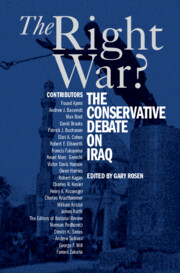Book contents
- Frontmatter
- Contents
- List of Contributors
- Introduction
- 1 Iraq's Future – and Ours
- 2 The Right War for the Right Reasons
- 3 Iraq: Losing the American Way
- 4 Intervention With a Vision
- 5 An End to Illusion
- 6 Quitters
- 7 A More Humble Hawk; Crisis of Confidence
- 8 Time for Bush to See the Realities of Iraq
- 9 Iraq May Survive, but the Dream Is Dead
- 10 The Perils of Hegemony
- 11 Like It's 1999: How We Could Have Done It Right
- 12 Reality Check – This Is War; In Modern Imperialism, U.S. Needs to Walk Softly
- 13 A Time for Reckoning: Ten Lessons to Take Away from Iraq
- 14 World War IV: How It Started, What It Means, and Why We Have to Win
- 15 The Neoconservative Moment
- 16 In Defense of Democratic Realism
- 17 ‘Stay the Course!’ Is Not Enough
- 18 Realism's Shining Morality
- 19 Has Iraq Weakened Us?
- 20 Democracy and the Bush Doctrine
- 21 A Time for Humility
- 22 Birth of a Democracy
- Index
1 - Iraq's Future – and Ours
Published online by Cambridge University Press: 10 August 2009
- Frontmatter
- Contents
- List of Contributors
- Introduction
- 1 Iraq's Future – and Ours
- 2 The Right War for the Right Reasons
- 3 Iraq: Losing the American Way
- 4 Intervention With a Vision
- 5 An End to Illusion
- 6 Quitters
- 7 A More Humble Hawk; Crisis of Confidence
- 8 Time for Bush to See the Realities of Iraq
- 9 Iraq May Survive, but the Dream Is Dead
- 10 The Perils of Hegemony
- 11 Like It's 1999: How We Could Have Done It Right
- 12 Reality Check – This Is War; In Modern Imperialism, U.S. Needs to Walk Softly
- 13 A Time for Reckoning: Ten Lessons to Take Away from Iraq
- 14 World War IV: How It Started, What It Means, and Why We Have to Win
- 15 The Neoconservative Moment
- 16 In Defense of Democratic Realism
- 17 ‘Stay the Course!’ Is Not Enough
- 18 Realism's Shining Morality
- 19 Has Iraq Weakened Us?
- 20 Democracy and the Bush Doctrine
- 21 A Time for Humility
- 22 Birth of a Democracy
- Index
Summary
On november 21, 2003, some minor rocket attacks on the Iraqi oil ministry and on two hotels in Baghdad elicited an exceptional amount of attention in the global media. What drew the interest of journalists were the terrorists' mobile launchers: they were crude donkey carts.
This peculiar juxtaposition of 8th- and 21st-century technology was taken as emblematic of the entire American experience in Iraq – an increasingly hopeless clash between our overwhelming conventional strength and stealthy terrorists able to turn our own lethal means against us with cheap and ubiquitous native materials. How could we possibly win this contest, when an illiterate thug with a rusty RPG (rocket-propelled grenade) launcher could take down a West Point graduate along with his million-dollar Black Hawk helicopter while those upon whom we have been lavishing our aid cheered our deaths and ransacked the corpses?
In an extensive, on-the-ground account of the post-bellum chaos, George Packer in a recent issue of the New Yorker lists an array of missteps that brought us to this sorry pass. We put too much trust in exiled Iraqis; we allowed looters and fundamentalists to seize the initiative right after the war; we underestimated both the damage done to the infrastructure by Saddam Hussein and the pernicious and still insidious effects of his murderous, Soviet-style government hierarchy. Mark Danner, in the New York Review of Books, relates much the same story, emphasizing our tolerance of looting and our disbanding of the Iraqi army as factors contributing in tandem to the creation of the Iraqi resistance, now thriving on a combination of plentiful cash (from looting and prewar caches) and a surplus of weaponry and manpower (from the defunct army).
- Type
- Chapter
- Information
- The Right War?The Conservative Debate on Iraq, pp. 7 - 17Publisher: Cambridge University PressPrint publication year: 2005



